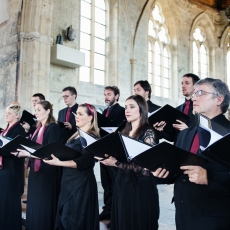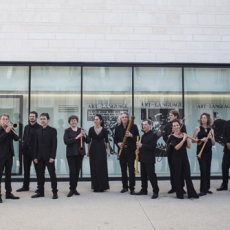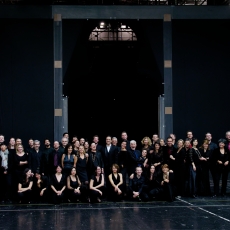Chœur de Chambre de Namur - Arcadelt - American Record Guide
This is a broad selection of Jacques Arcadelt’s motets, madrigals, and chansons. The first disc includes nine motets and the Agnus Dei from Arcadelt’s Ave Regina Caelorum Mass. This Mass can be found complete on two earlier recordings of his sacred music (S/O 2011, M/A 2013) along with some motets; the only overlap between the two earlier releases and this new recording is the eight-voice setting of the ‘Pater Noster’.
The 15-voice Choeur de Chambre de Namur is accompanied in Arcadelt’s original compositions by organ. Only the 19th Century arrangement by Pierre-Louis-Philippe Dietsch of Arcadelt’s chanson, ‘Nous voyons que les hommes’ as ‘Ave Maria’ is sung a cappella. The voices have a full, rich sound, and Alarcon leads them in very stylish interpretations. The “bonus” on this disc is Franz Liszt’s ‘Ave Maria d’Arcadelt’, based on Dietsch’s arrangement.
The selection of Arcadelt’s madrigals on the second disc begins with ‘Il bianco e dolce Cigno’, published in his first book of madrigals in 1539 (reprinted complete as late as 1654). Also included is ‘Deh! Dimm’ Amor se l’alma di costei’, one of two poems by Michelangelo set by Arcadelt.
Cappella Mediterranea is a chamber ensemble of six singers, each an excellent soloist; together create a rich, balanced sound. Most of the madrigals are accompanied by one or two lutes or occasionally by Alarcon (hpsi or org); only two are performed a cappella. The instrumentalists begin many of the madrigals by playing the opening phrases as an introduction. That might be effective in concert but seems a bit affected on a recording.
Variety is enhanced by replacing some of the original voice parts with instruments. Five madrigals are turned this way into solos, including ‘Deh! Dimm’ Amor se l’alma di costei’ sung by Marianna Flores accompanied by Alarcon on harpsichord, and Petrarch’s sonnet, ‘Hor che’l cielo et la terra’ (later also set by Monteverdi, among others), sung by Valerio Contaldo with the two lutes. Seven of these madrigals by Arcadelt, including ‘Deh! Dimm’ Amor’, ‘Il bianco e dolce Cigno’, and ‘Ancidetemi pur grievi martiri’, appeared on an earlier recording by the Consort of Musicke (M/J 1992). While I was unable to listen to that for comparison, this new selection is excellent, with very effective interpretations.
The third disc samples Arcadelt’s chansons performed by the five singers, lute, harp, and a consort of recorders, led by Denis Raisin Dadre. Most of these selections are not as well known as the madrigals, but we do hear the original ‘Nos voyons que les hommes’ used for the ‘Ave Maria’ arrangement heard on the first disc. Dadre varies the combinations of voices and instruments and sometimes “orchestrates” shifting textures implied in the original voice parts. The interpretation effectively brings out the melodiousness and rich harmonies of Arcadelt’s settings. This disc also includes a bonus, Giovanni Maria Trabaci’s arrangement for solo harp of Arcadelt’s madrigal, ‘Ancidetemi pur’, elegantly performed by Angelique Mauillon on a baroque triple harp.
While a fourth disc, with a Mass or two by Arcadelt, would have made this a truly comprehensive selection, at least there are the two recordings of the Ave Regina Caelorum Mass mentioned above, and the Noe Noe Mass was recorded by Henry’s Eight (N/D 1999: 290).
The booklet includes informative essays about the music along with complete texts and translations. Arcadelt’s significance and influence, along with the quality of both the selections and interpretations here, assure that it will be a significant addition to any collection of renaissance music.



